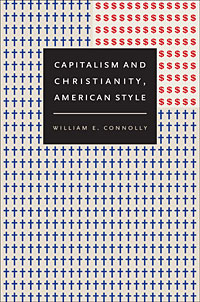
There is a sense when one steps into the produce section at the Whole Foods that one has entered a sacred space. The delicate ambiance created by the well-tuned lights and the gentle purr of background music cloaks the organic kale in an almost mystical aurora. Like a church service, Whole Food’s shoppers dress for the experience, donning bright shades of Yoga pants, organic slippers made with bamboo reeds, or any locally-made organic cotton tee—in a concerted effort to show the completeness of their healthy and ecologically-sensitive lifestyle. Moreover, when they reach the checkout line and fork over what for many normal folks amounts to a whole paycheck, the acolytes gently absorb this small sacrifice as doing their part for the environment and their bodies….
While the abuses of power and privilege in modern banking may not be as explicit as David’s crime, they are parallel. People in power tend not to consider the cost of their self-interest in communal terms. Most families who are facing foreclosure in New York City today are the victims of banks who regard a homeless child as a reasonable side effect of their profit motive just as David regarded Uriah’s death as a reasonable way to Bathsheba.

Michael Sandel has provided an interesting critique of markets that will likely be of interest to the socially concerned theologian. While this is an area he has long given attention to, his 2012 release What Money Can’t Buy: The Moral Limits of Markets asks the question: “What is wrong with a world where everything is for sale?” Whereas theological appraisals of markets emphasize that “Markets marginalize,” Sandel has proclaimed “Markets leave their mark.” In other words, beyond inequality and fairness, Sandel asserts that markets don’t simply allocate goods, but they “express and promote certain attitudes toward the goods being exchanged”…..

It’s moments such as these that are only possible on the web… After hearing some amount of Facebook-based moral outrage from friends both progressive and conservative, centered somehow around the fast food chain, Chick-fil-A, I decided I better pull my head out of the sand and see what the kerfuffle was all about. The first story I read was an LA Times editorial on Chick-fil-A and free speech. I’ll return to the content of that story in a moment, but as I reached the bottom of the page, my eyes uncharacteristically caught sight of the advertisement. It’s offer? Free Chick-fil-A!
The scathing criticisms of private property that we find in the mouth of Jesus are well-known. “Go, sell what you have,” he tells the rich man who asks for the secret of eternal life (Mark 10:21; Matthew 19:21; see also Luke 12:33). Again and again, we encounter the polemic against property, the possession of which is regarded as an evil and as a massive hindrance to joining the kingdom of God. Jesus valorises simplicity over luxury and forgoes the influence and power that comes with wealth. In short, everything about him stands against the deep values of the Hellenistic propertied classes. In the words of G.E.M. de Ste. Croix, “I am tempted to say that in this respect the opinions of Jesus were nearer to those of Bertholt Brecht than to those held by some of the Fathers of the Church and by some Christians today” (Ste. Croix 1981: 433).
I am less interested here in the twisting and turning by later exegetes to ameliorate these embarrassing texts, and my concern for now is not the Christian communist tradition that finds inspiration in these and other texts (Acts 2:44-5; 4:32-5). Instead, I suggest that this implacable opposition to property has a far deeper reason. Simply put, the very definition of private property, invented by the Romans a little over a century before the time of Jesus, is based upon slavery. That is, private property relies on the reduction of one human being to the status of thing (res) that is “owned” by another human being. Let me explain…..
